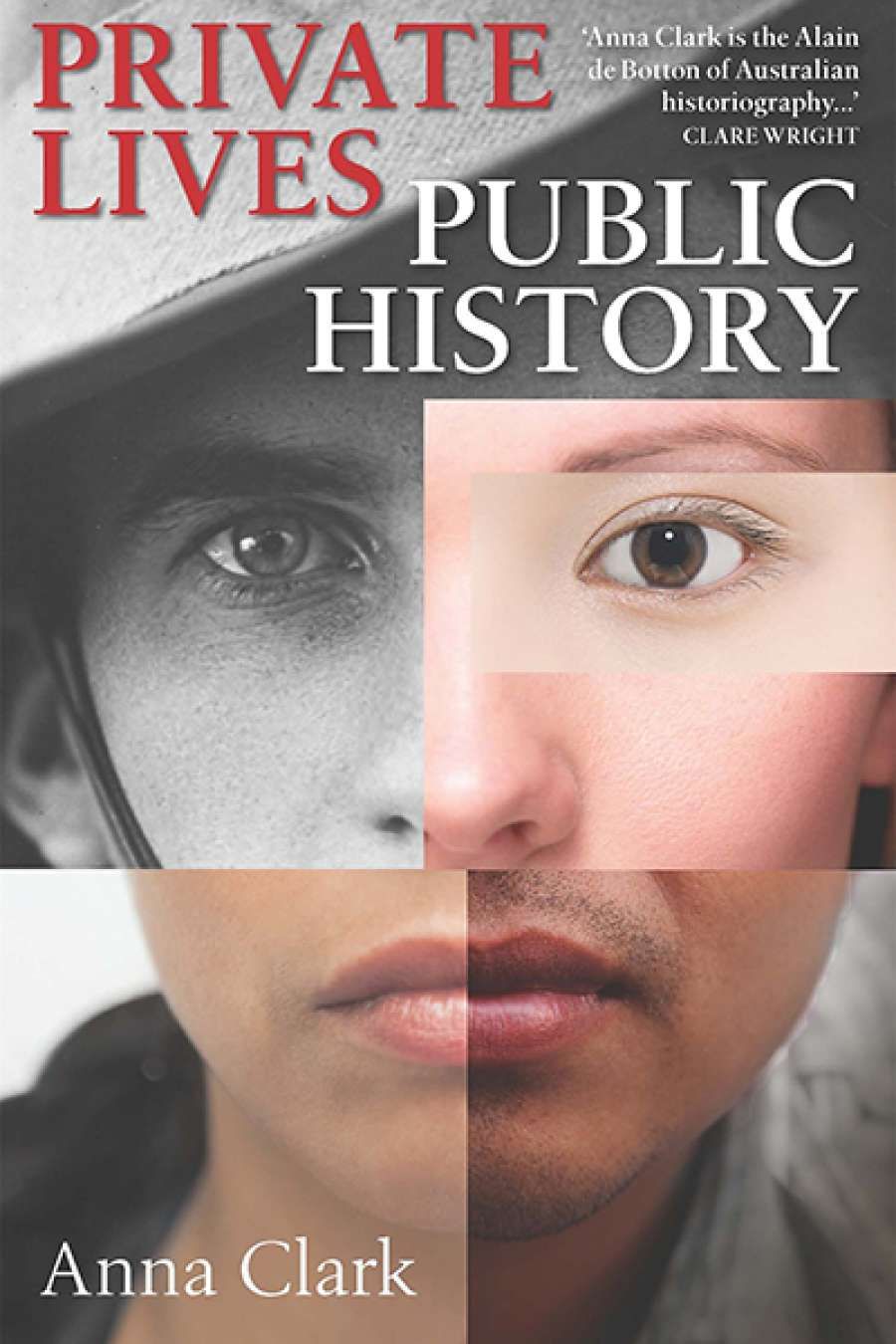
- Free Article: No
- Contents Category: Australian History
- Custom Article Title: Billy Griffiths reviews 'Private Lives, Public History' by Anna Clark
- Book 1 Title: Private Lives, Public History
- Book 1 Biblio: Melbourne University Publishing, $27.99 pb, 192 pp, 9780522868951
In her search to reconcile private lives with public narratives, Clark avoids too strident a definition of 'History'. Her conversations with participants centre on anything that has happened or may have happened, places and objects that carry stories, personal memories, and textbook narratives: all things pastness. History is belonging, identity, inheritance, enactment, and memory. It is something we pass on and search out, something we learn and ignore, and most of all it is something we do. This is an open and democratic approach to history. Clark recognises that we are all history-makers.
She is particularly interested in exploring the ways in which intimate and personal histories combine with official narratives and public history. While most participants felt as if they had been exposed to official histories, they struggled to find relevance, meaning, and attachment to 'great events' such as the Gold Rushes or Federation: '[I]t's just not us,' one participant says, 'We're for us, not for what they were.' As Clark writes of another participant, 'there was no point in the past if it didn't connect'. She pursues this tension across five broad and overlapping chapters on 'connection', 'inheritance', 'commemoration', 'contest', and 'place'.
At its best, the book taps into a 'fascinating vernacular discussion on the tension between historical judgment and empathy'. (Clark's opening is especially memorable: 'History!' Her taxi driver exclaims on hearing of her job, 'Australian history is just white people came here and killed the Aboriginals. Is not history, is bullshit!') Sadly, Clark is constrained by the very dataset she has so carefully compiled and curated. She is patient and generous in her reading of the transcripts, eager to be inclusive and to value the structure and content of everyday conversations about history. But for every gem of vernacular wisdom, there are a dozen clichés or vague generalities, which are also drawn out and seriously examined. Take this range of responses, for example, which form an important part of three distinct chapters:
How did you feel when Prime Minister Kevin Rudd apologised to the Stolen Generations?
'Good. Very Good,' 'It was a very good experience,' 'I thought it was wonderful,' 'Props Kevo,' 'Long overdue,' 'Much overdue,' 'I felt very pleased that someone did get up and say something. Yes, very pleased.' 'It was just symbolism as far as I'm concerned. It did nothing,' 'I have no problem with it. I have no problem with the original Stolen Generation, either. They thought they were doing the right thing at that time.'
Or these responses, which were drawn out over the course of the chapter 'Contest':
Why do you think people disagree about the past?
'There's always more than one side to a story,' 'Well, there are always different sides, two sides to one story,' 'Because they have different perspectives,' 'There are different perspectives from different areas,' 'You can interpret what happened in all manner of different ways, depending on your viewpoint.'
 Sorry - Australia Day 2008 (photograph by Dave Keeshan, Wikimedia Commons)The conclusions Clark draws from these interviews are equally broad and unsatisfying. 'Participants displayed a capacity to think historically,' Clark reflects: 'my research confirms not all history is the same.' History, she finds, means different things to different people, and most 'ordinary' Australians can recognise and accommodate this subjectivity.
Sorry - Australia Day 2008 (photograph by Dave Keeshan, Wikimedia Commons)The conclusions Clark draws from these interviews are equally broad and unsatisfying. 'Participants displayed a capacity to think historically,' Clark reflects: 'my research confirms not all history is the same.' History, she finds, means different things to different people, and most 'ordinary' Australians can recognise and accommodate this subjectivity.
While Clark might feel a duty to the interviews she has collected, the richest strains of Private Lives, Public History are to be found elsewhere. Clark is at her best navigating the literature and rendering academic insights into clear and accessible prose. She (bravely) trawls anonymous comments on internet blogs and reflects on public debates about Anzac Day and Australia Day through the 'letters to the editor' section of the newspaper. And she seamlessly weaves her own personal reflections into the historiographical discussion, adding warmth and humour to what is otherwise a very earnest endeavour.
Taken as a part of Clark's historical oeuvre, this project of 'oral historiography' is admirable and innovative scholarship. She is delving deeply into a topic – Australian history – that is paralysed by the paradox of being seen as both too boring and too controversial. But the book is constrained by its scope: it is neither a popular foray into Australian historiography, nor does it have the definition and depth of a book-length scholarly history.


Comments powered by CComment